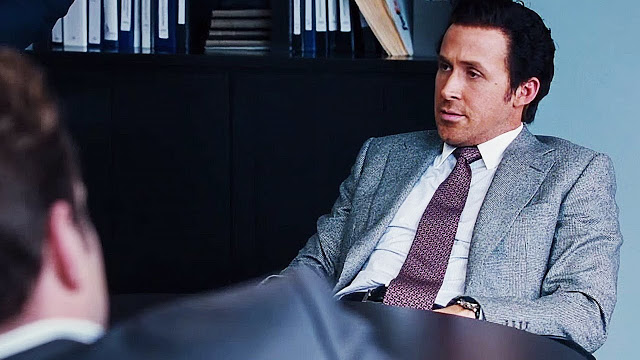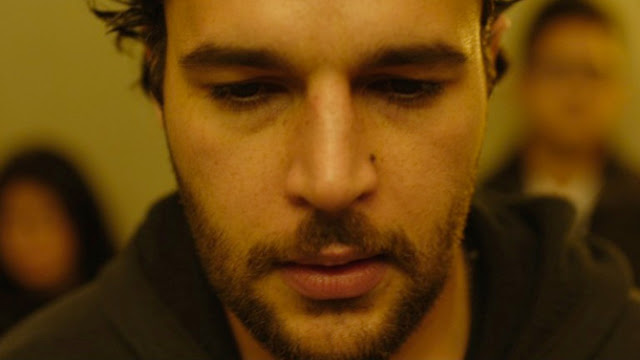 The holiday season is a time for gifts, and in 2015, the multiplex delivered its usual assortment of delightful treasures and lumps of coal. Due to time and space constraints (OK, mostly time), the Manifesto is providing shortened, capsule-like reviews for the numerous theatrical releases we saw during the holidays. We’ll begin with three movies today, followed by an additional three next week.
The holiday season is a time for gifts, and in 2015, the multiplex delivered its usual assortment of delightful treasures and lumps of coal. Due to time and space constraints (OK, mostly time), the Manifesto is providing shortened, capsule-like reviews for the numerous theatrical releases we saw during the holidays. We’ll begin with three movies today, followed by an additional three next week.
Let’s dive right in, beginning with a comedy about utter disaster.
The Big Short
The Big Short is a docudrama about a dark time in recent American history, when millions of people lost their homes, their jobs, and their faith. Did I mention that it’s a comedy? That seems absurd, but cognitive dissonance is this movie’s stock in trade, and it proves an appropriate response to an insane situation. Director Adam McKay (best known for Anchorman, plus some lesser Will Ferrell comedies), adapting Michael Lewis’s best-selling book, recognizes that humor is the perfect mechanism for conveying outrage. The Big Short is a laugh riot, but it is also a screed, coursing with fury and indignation. It makes you laugh, but its primary purpose—its reason for assembling such a bevy of cinematic talent into a movie about something as dry as financial markets—is to make you angry.
To that end, the film is almost gleeful in its partisanship; it depicts bankers and mortgage brokers (including New Girl‘s Max Greenfield) as avaricious assholes with no conscience, happily racking up commissions on homes that buyers clearly can’t afford while barely even checking the paperwork. Ordinarily, this would raise the specter of filmmaking bias, suggesting a polemical tone that sacrifices fact-checking for finger-wagging. The brilliance of The Big Short is that, while its motivation of exposing the duplicity and dishonesty of Wall Street is undeniable, its presentation is uncommonly rigorous. It scrupulously details, with equal parts disgust and disbelief, the absurd sequence of events that led from boom to bubble. (In a sense, it functions as a prequel to 99 Homes, Ramin Bahrani’s equally angry, far less amusing dramatization of the housing crisis in Florida.) McKay has made movies about inept cops and idiotic racecar drivers, but he’s never made a film about people as terrifyingly incompetent and immoral as the hedge fund administrators and investors who so cavalierly managed your money and your livelihood during the 2000s, before the whole thing went to hell.
Of course, it is a good deal more complicated than that, which presents McKay with a formidable challenge: How do you make a movie entertaining when its plot traffics primarily in obscure, indigestible topics such as mortgage-backed securities, tranches, credit default swaps, and collateralized debt obligations? He responds with a number of solutions, some more successful than others. Stylistically, The Big Short is aggressively sloppy, with agitated handheld camerawork and frantic editing; it’s an energetic method that is as irritating as it is vivifying. But it’s also indicative of a cinematic playfulness that results in the movie’s greatest gambit, in which celebrities—including Margot Robbie, Anthony Bourdain, and Selena Gomez—routinely appear out of nowhere to engage in direct address and patiently translate the movie’s economic mumbo-jumbo by way of thoughtful, relatively understandable analogies. It’s a technique that recalls Leonardo DiCaprio breaking the fourth wall in The Wolf of Wall Street; the difference here is that, while Martin Scorsese wasn’t remotely interested in explaining the actual mechanics of his antihero’s financial misdeeds, McKay is deeply, ahem, invested in articulating the steps that paved the way to the Great Recession.
His achievement in this regard is qualified—after watching The Big Short, I confess that I’m only slightly more knowledgeable about sub-prime mortgages and loan bundling than I was before. But maybe I should cut myself some slack, because even the experts in the movie seem to struggle to comprehend what’s happening, consistently reacting to new information with bug-eyed incredulity. (In one clever sequence, a character demonstrates the instability of the housing market to a team of skeptical traders via a makeshift game of Jenga, with individual wooden blocks representing crummy mortgages.) These moments represent The Big Short at its peak, deftly communicating the nitty-gritty underlying the economy’s collapse while also effortlessly entertaining its audience.
Ironically for a film that purports to serve as a voice for the common folk who got screwed by the bankers and the Wall Street elite, The Big Short isn’t all that skilled when it comes to people or feelings. Not that it doesn’t try; Christian Bale plays a reclusive fund manager who struggles to express his genius, while Steve Carell is essentially the film’s lead as a perpetually incensed trader who is coping with tragedy and who takes the negligence of the big banks personally. Both actors give very fine performances, but neither character really lands. The movie is better when it’s lighter, whether it’s spending time with Brad Pitt as a germophobic former insider or, even better, tagging along after Ryan Gosling, who plays Jared Vennett, an unapologetically nasty inside man. Jared serves as the movie’s vulgar mouthpiece and sometimes-narrator—”I’m pretty fucking cool,” he announces during an opening voiceover—and he’s consistently hilarious, whether he’s constantly belittling his hapless assistant or savagely insulting his partners. Jared’s blithe amorality is the funniest component of The Big Short, a frequently hysterical movie that will have you in stitches even as it insists, with laudable sincerity, that there is nothing funny about this.
James White
James White is a movie about a selfish young man whose mother is dying of cancer. If you think that sounds unpleasant, you don’t know the half of it. Here is the film that piles one foul scene on top of another, in the misguided hope that it will amount to something penetrating or profound. Instead, all we learn is that the title character is no fun to be around, and the same goes for the miserable movie that surrounds him.
James, played persuasively by Christopher Abbott (looking beefier than he did as Allison Williams’s pitiful boyfriend on Girls), is described by one person as a mess. That description is accurate, if incomplete. James is a complete disaster—unemployed, erratic, perpetually drunk, and almost always cruel. He frequently gets into fights, he cheats on his girlfriend, and his hair-trigger temper makes even his friends and family wary of him. The only thing he seems to be halfway good at, other than head-butting bar patrons or slapping party guests, is caring for his mother (Cynthia Nixon), who is nevertheless inching closer toward death every day.
To call James unlikable is something of an understatement; he’s generally insufferable. This alone is not a crippling cinematic defect; many good movies, not to mention the vast majority of recent prestige television dramas, center on inherently flawed protagonists. The problem with James White isn’t that James is mean—it’s that he’s monotonous. There is no shading to his character, no sense of dimension beyond his resentment and his wrath. James is a time bomb, but James White never illustrates what makes him tick.
Perhaps recognizing this, first-time writer-director Josh Mond (who produced the excellent Martha Marcy May Marlene) attempts to enliven the proceedings with constant close-ups and jittery handheld photography. It’s a claustrophobic approach that’s less intimate than nauseating; Abbott seems to spend half the movie with the camera shoved right in front of his face, as though James might smack you in the mouth if you irritate him. When the film suddenly cuts from the crowded streets of Manhattan to a static wide shot of a sun-dappled beach in Mexico, you practically inhale the fresh air. Naturally, such peace is short-lived, and before long, James White returns to its blotchy New York interiors, and to the ugly interactions that pass for its storyline.
There is the faint echo of a good movie lurking within James White, a moving character study of grief and rage. (Most critics apparently heard this echo full-blast; the film currently sports a 91% rating on Rotten Tomatoes.) Abbott lends James an edgy physicality, occasionally flashing some charisma to go with his persistent scariness. A scene where James earnestly attempts to pick up a teenage girl (Makenzie Leigh, doing her best with a paltry part) has a twitchy energy, while an interview between James and a prospective employer (Ron Livingston) provides a much-needed moment of frankness. And the movie finally achieves genuine emotion during a stunning long take in its third act, when James comforts his frail mother with fanciful visions of a warm future.
But that scene feels like an oasis of decency within a desert of miserabilism, and it is not enough to redeem James White from its unrelenting gloom. There is no growth here; the film ends as it began, with James striding through the city, his face an emotionless mask. I suppose one can applaud Mond for refusing to conclude matters with a false note of redemption. At the same time, the downbeat ending results in an unintended circularity. James has gone nowhere, just like this movie.
Joy
David O. Russell thrives in chaos. His past two movies, Silver Linings Playbook and American Hustle, were hysterical madcap comedies that also subtly mined drama from their characters’ frantic exuberance and social dysfunction. Those films’ rambunctious energy masked their underlying sweetness, resulting in love stories that were gleefully uproarious but also surprisingly poignant. Joy, Russell’s third consecutive collaboration with star Jennifer Lawrence, is a terrifically messy and messily uneven film that highlights both Russell’s strengths and weaknesses as a storyteller. Its familiar, rags-to-riches narrative is disappointingly straightforward, unspooling with a cleanliness that proves an awkward fit alongside Russell’s gift for comic mayhem. But it is also a heartfelt character study, one that demonstrates uncommon affection for its heroine and her predictable ups and downs. Russell may struggle with plots, but he knows and loves his characters.
And Joy has plenty of those, many living under the same roof. Lawrence’s eponym is not technically the head of this bustling household, but she appears to be the only person capable of preventing it from disintegrating into a warzone. Her mother (Virginia Madsen) sits bedridden all day, watching soap operas that invade Joy’s dreams, while her estranged father (Robert De Niro) suddenly moves back in and is shunted to the basement, which he must share with Joy’s sweet-natured, largely useless ex-husband (Édgar Ramirez); Joy divides the room with a ream of toilet paper as though she’s parenting two toddlers. She already has two of those herself, who are occasionally supervised by her grandmother (Diane Ladd), a kindly but needy octogenarian who also serves as the film’s extraneous part-time narrator. Facing difficulties at her thankless job at the airport and struggling to mother both her children and her parents, Joy seems on the verge of collapse, beset with one wearying setback after another.
This manic opening act finds Joy at its busiest, which is where Russell is at his best. He does not so much find order in chaos as amplify that chaos until it becomes its own life-sustaining organism, breathing air into a movie that is constantly gulping down oxygen. Characters talk over one another, conversations sputter in fits and starts, people walk into and out of rooms with their own selfish agendas, and nobody ever seems to listen to anyone else. These early scenes of ordinary domestic drama ring with the cluttered clamor of real life, but they are also sufficiently coherent—keeping up with this movie may be exhausting, it is never exasperating. Well, not for you; it is certainly excruciating for Joy, the eye of this high-strung hurricane. Beautifully played by Lawrence, Joy is a smart, fierce woman whose very identity is slowly being eroded by the sheer agony of living in a cruelly indifferent world.
Eventually, she gets an idea, at which point the film both surges forward and grinds to a halt. Desperate to generate some income, Joy develops the design for the Miracle Mop, that self-wringing plastic marvel that has spared millions from dirty hands and strained backs. At this point, Joy transforms into a tale of triumph in the face of adversity, as its protagonist plunges into the unforgiving world of big business in an attempt to market her invention to stingy customers. In doing so, she faces a number of challenges: convincing her father’s new girlfriend (Isabella Rossellini) to act as her financier, preventing her suppliers from ripping her off, and, most pivotally, selling the idea of the mop to Neil Walker (Bradley Cooper), the boss of a retail chain called Kmart and the head of a newfangled home-shopping TV network named QVC.
On paper, this has the makings of a perfectly acceptable story, but as Joy delves deeper into the making of the mop, it grows increasingly listless. It’s as though Russell, so accustomed to juggling multiple balls in the air, is uncertain of how to sustain energy when he’s navigating such a straightforward storyline. It’s unclear if he’s satirizing the dog-eat-dog culture of American consumerism, but regardless, most of the scenes involving the mechanics of Joy’s business—which should hum with the thrill of discovery and the excitement of insider knowledge—instead fall flat. Part of the problem is Cooper; so revelatory in Russell’s prior two movies, he never seems comfortable here, failing to imbue Neil with the spark of visionary ingenuity that he’s clearly supposed to possess. But beyond that, Joy just lacks narrative drive. With the exception of an exhilarating scene in which Joy anxiously pitches her mop on live TV—a moment that is as suspenseful as the climactic big game in a sports movie—the film feels weirdly incomplete, a terrific lead character in search of a worthy story.
And yet, that character is so well-drawn, and so credibly portrayed, that Joy‘s narrative shortcomings don’t submarine the film entirely. Hugely talented, Lawrence can invest even thin material with gravity and meaning—witness the latter Hunger Games movies—and here she essays a furiously compelling figure, passionate and empathetic but also smart, driven, and even a little bit ruthless. Even when Joy isn’t going anywhere in particular, Joy herself is always a delight to be around, and it’s satisfying to watch a movie featuring a strong female character that isn’t preoccupied with romance (needless to say, the film aces the Bechdel Test). Russell may be disinterested in his plot (and remain prone to sappy endings), and he may indulge in some lazy on-the-nose music cues (she feels free!), but he’s undeniably invested in his heroine. Early in the movie, we’re told that Joy rejoices in making things. And Joy, for all its faults, is clearly the product of a director who rejoices in making movies. With a partner like Lawrence, it’s hard to blame him.
Jeremy Beck is the editor-in-chief of MovieManifesto. He watches more movies and television than he probably should.



